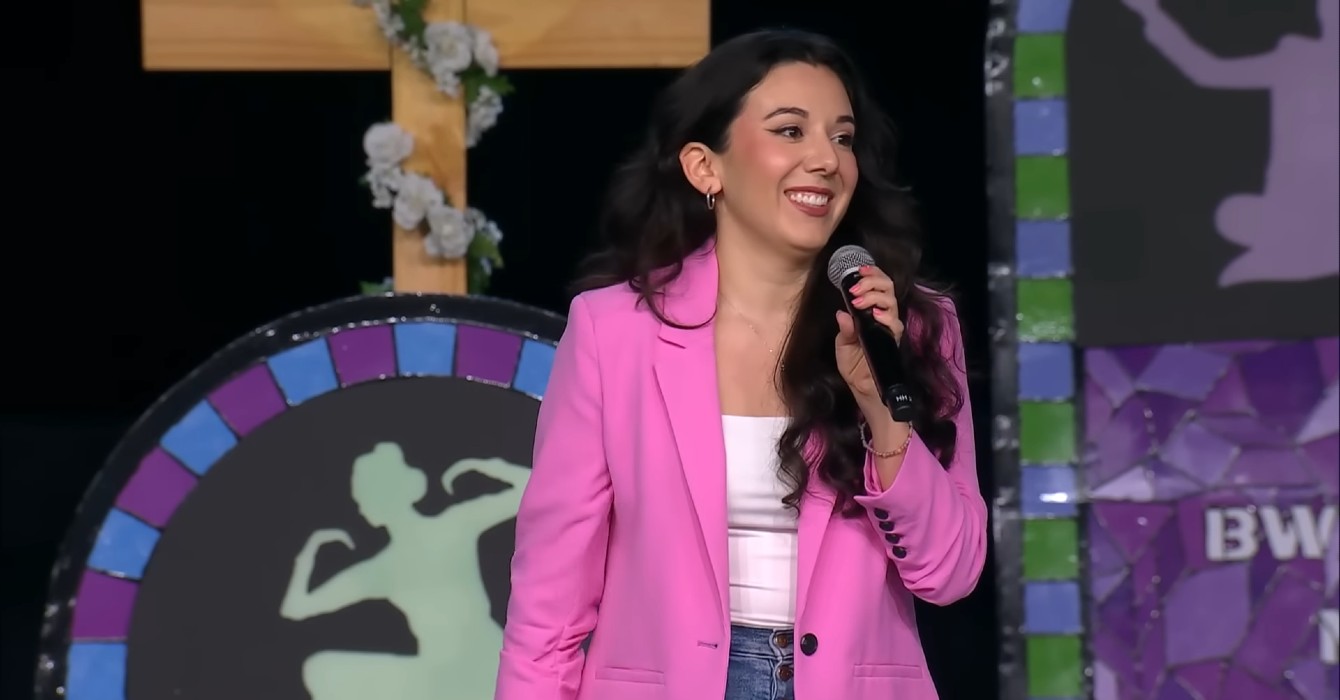Last April, I got on a stage wearing sneakers and a Barbie-pink blazer to address the United Methodist Church. There were thousands of people in the room, and many thousands more around the world watching on Zoom.
My palms were sweating and, at times, my voice cracked as I gave the Young People’s Address at the United Methodist Church’s 2024 General Conference, a tradition since 2008.
I’d actually been invited to give this talk in 2020, but that year the conference, which typically meets every four years to determine legislative details of the United Methodist Church, had been postponed because of COVID-19. This particular gathering was going to be historic, as it was expected that there would finally be voting on the removal of queer-excluding language from the Book of Discipline.
I stood there, four years older now, to talk to my fellow Methodists about something that felt both difficult and obvious. I talked about the past few years, the realities of loss and death from COVID-19, wars, climate collapse. I talked about the split in the UMC, which feels to me like a painful divorce.
I felt emotional talking to and about the church I love. I’ve been involved with the United Methodist Church throughout my childhood, teens and early 20s and am currently a candidate for ordination through the Florida Conference.
The experience itself was incredible. But in the days following the speech, I was shocked by the question I was asked by journalists doing follow-up stories on the speech.
“Are young people even interested in spirituality anymore?”
I don’t believe that people having a formal faith tradition is the only answer to a good life (nor do I believe that having a strong faith guarantees prosperity and ease). But I do believe that our well-being is a holy trinity of sorts and is part of what makes us human. Our mental, physical and spiritual well-being blend together to make up our personhood.
So when I was asked that question, I felt as if I was being asked whether millennials and Gen Zers are something other than human!
By no means do I think that any one demographic — age group, race or any other social identity — is a monolith. And the decline of young people in the church, whether from their stepping away from organized religion or having grown up without a formal faith tradition, is a complex topic.
I obviously can’t speak for all young people. But I do think that most young people care about spirituality in some capacity or are trying to find some sort of avenue for meaning making.
After all, what is theology if not that: a mode for meaning making of human experience, this thing we call life, which rarely makes sense. I haven’t met too many young people who aren’t concerned about their future, about climate collapse, about political unrest and war, even if they don’t go to church to get solace for their fears.
Many scholars are researching the turning tides in American Christianity and the waves of “nones” and “dones” we are seeing now in younger generations. One of the common themes is the not-so-charming reputation that the church has inherited from generations before. In one survey of nonreligious Americans, 42% said that “religious hypocrisy” was the reason they left the religion, and 31% named “religious bigotry.”
As we continue to hear the religious rhetoric around abortion care, anti-queer/anti-trans legislation, and even the demand for Christian-centered prayers in public schools, is the mass exodus of younger generations — who are more progressive than their parents — all that shocking?
And yet I sat on the phone with these journalists and was asked, “Are young people even interested in spirituality anymore?”
The answer is yes. And the answer to the unspoken though underlying question within that question (How do we get young people to come back to our churches?) is perhaps painfully simple, though difficult to enact.
I think there is a particular aspect of its reputation that capital-C Church needs to repair: the harm done by the religious right. Whether or not your local church actually has anything to do with the religious right, to those who have been harmed by religious institutions or who have associated religious institutions with harm, a church is a church.
I don’t think every congregation has to have a float in the local Pride parade and display BLM banners to win the favor of young people (though I do think it could help), but I wonder how local churches could show up in their local communities in tangible, shame-free, loving ways.
In any community, there are going to be immediate unmet needs among young people — crises of housing insecurity, food insecurity, substance use and addiction, human trafficking, the loneliness epidemic. Churches can find ways to help.
Could your church open up your building for nonreligious community events? Might you partner with local businesses for block parties or other events?
The reputation of religious institutions has been greatly tainted by the harm done by key actors of the religious right. I think young adults need and want to engage, but they don’t want to be part of an institution that is rooted in the oppression of others. And that’s how many see the church — all churches.
It might not be your local church’s mess to clean up. But helping restore the faith of young people is all churches’ responsibility. Find out what young people in your area need. Then meet them where they are. And be the church.
Jesus is out there, as I said to the crowd at General Conference. The magic of the Spirit is out there. Are we working toward liberation? Are we working toward health? Are we working toward unity that makes this earth look less like hell and more like heaven?
I haven’t met too many young people who aren’t concerned about their future, about climate collapse, about political unrest and war, even if they don’t go to church to get solace for their fears.























